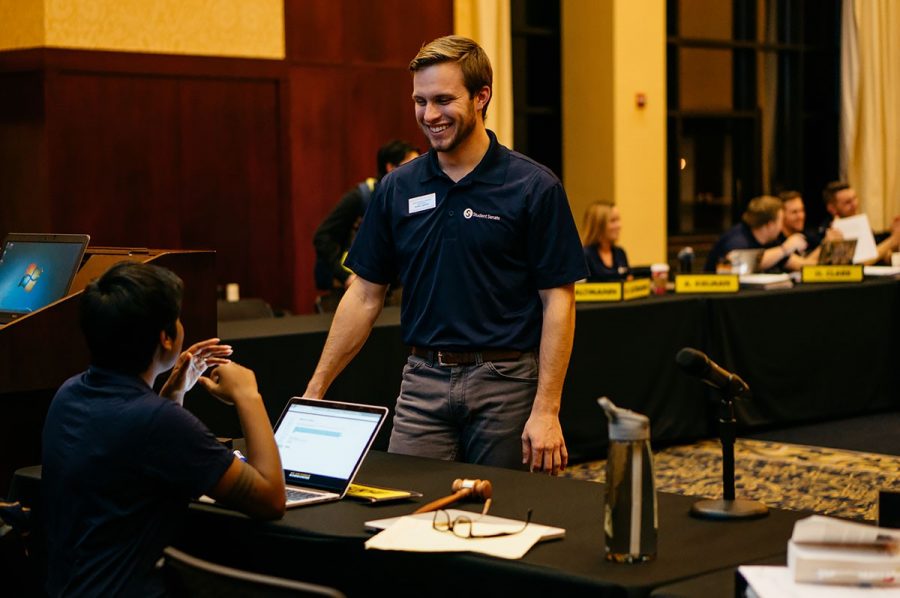Senate passes $1.2 million bill and discusses shared governance
Bill furthers technology on campus and a resolution prompts conversation on student representatives’ voices
More stories from Hillary Smith
Photo by Amanda Thao
Student Senate discussed their role as student representatives for the university.
Student Senate approved a bill for a $1.2 million budget allocating student technology fees for 2018 and a resolution advocating for shared governance.
Information Technology Director Jarrett Yuknis reintroduced the bill, which was first presented to the body last week. The bill passed, but before the vote, some senators raised their concerns.
Senator Bobbi Freagon moved to table the bill rather than vote on it that night. When the motion did not receive the second required, Freagon moved to have a public forum discussing the bill.
“I feel like we haven’t talked about it a lot, and it is a lot of money,” Freagon said. “I feel the timing with the holiday may have prevented some people from getting information.”
Yuknis responded saying in the last four years, no students have attended public forums. He had extended his office hours the week prior, making himself available to inform and discuss the bill with anyone who had questions or concerns. Holding the bill to wait for student input they most likely would not receive would be foolish, Yuknis said.
Several other Senate members said they supported the bill because it will directly benefit students with the upkeep and innovations of campus technology. In the end, the vote approving the bill was unanimous.
However, the vote for the resolution was not.
Intergovernmental Affairs Director Nick Webber introduced the resolution, which supports restoring shared governance in the University of Wisconsin System.
Shared governance is a system of rules and policies in place to engage groups and individuals in decision-making processes. Those included in shared governance are also held accountable for the decisions made.
Shared governance in the UW System is dictated by state legislation. In 2015, modifications were made to Wisconsin State Statute 36.09(5) where the shared governance of student government in the UW System was changed so students were advisors to the chancellor rather than active participants in the governance.
“Restoring shared governance to its form prior to 2015 would allow students to have a greater say in decisions made regarding student life, service and interests,” the resolution stated.
Some Senate members, including Mascot Coordinator Sam Milewsky, talked up the resolution. Milewsky, a co-author of the resolution, said the timing was excellent as it coincides closely with the student representatives’ lobbying trip to Madison.
“It will really get the conversation rolling with other campuses and state legislators,” Milewsky said, “So not only do I heavily support this, but the time to do this is now.”
Webber also spoke in strong support of the resolution and for restoring shared governance.
“I believe that there’s been a great injustice done to the students of the University of Wisconsin System,” Webber said. “And frankly I would like to send a clear message to the Wisconsin state legislature that we are more than an advisory committee, we are student leaders, we are engaged on campus and there is no better people to make these decisions than us.”
The resolution passed but there was one voice of dissent.
Senator Maria Delgado Gomez voted down the resolution because she said the modified, current phrasing in place is more beneficial to student governments. She said the new verbiage separates the students into an advisory position, which makes their voices stronger than in shared governance.
In an advisory position, the student body president’s signature is required on any budget submitted by the chancellor. Therefore, if the chancellor passes a budget without the signature, the students can hold him accountable by notifying the UW System of the infraction.
“At best, if the university has a good relationship with the students, changes are put forth in mutual agreement,” Delgado Gomez said. “At worst, if good communication breaks down, it forces the university to still listen to its students.”
The student representatives will lobby in Madison Tuesday.











